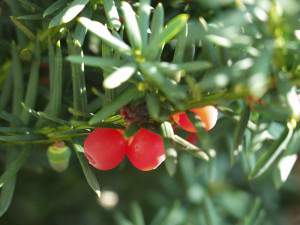The Most Common Poisonous Plants To Horses

I wanted to share with you some common plants that are poisonous to horses. Now most poisonous plants taste bad to horses because of the bitter taste, but if your horse is extremely hungry, has high levels of stress, has vitamin or nutrient deficiencies they may eat these plants.
The best thing you can do to protect against this is to make sure your horse has high quality forage (hay or pasture). Now accidents do happen though.
For instance you might have a neighbor that thinks they are doing your horse a favor by dumping their grass clipping over the fence into your horses pasture. These grass clippings may have Yew mixed in with it which is extremely toxic to horses.
Some of The Most Common Poisonous Plants
- Bracken Fern
- Boxwood

Boxwood - Johnsongrass
- Sudan Grass
- Locoweed
- Oleander

Oleander - Red Maple Trees
- Tansy Ragwort
- Water Hemlock
- Yellow Star Thistle
- Yew
Plant Poisoning Symptoms
Just keep in mind that the type and amount of plant eaten will dictate the issues. These are some of the issues you might notice.
- Respiratory
- Gastrointestinal
- Nervous system
- Cardiovascular systems
- Liver, Blood and/or Kidney problems
It can be a real challenge to diagnose plant poisoning because the symptoms can mimic other conditions we see in horses such as:
- Disorientation
- Tremors
- Muscle Spasms
- Difficulty Swallowing
- Colic
- Fluctuating Heart and Respiratory Rates
- Excessive Salivation
- Collapse
- Abnormal Amounts of Urine Abnormal color of Urine
Some toxic plants will pose a serious threat to your horse. It can take just a few bites of certain plants to cause you horse to be really sick or even kill them.
Other plant toxins have the ability to build up over time and slowly poison your horse.

Another one that horse owners deal with is alsike Clover. It is a whitish pink color with serrated leaves. The big problem with this clover is that it can cause liver damage and the symptoms can take some time to manifest.
Potential symptoms from alsike clover poisoning might be:
- Photosensitivity or reaction to light (sunburn)
- Jaundice
- Anorexia
- Elevation of temperature
- Neurological symptoms
- Dark colored urine
- Colic
- Diarrhea
- Oral lesions
- Excessive salivation
- Mud Fever
- Scratches
In some instances, horses can die depending on the amount of alsike clover they consume. If your horse has any of these symptoms mentioned above contact your veterinarian immediately and get them off of the alsike clover.
